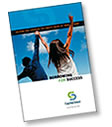Money Management
Made Easy
In the last issue we looked at financial fitness starting with your credit score. Your credit score is calculated based on your credit history — payment history, amount of debt, and the length of your credit history. A healthy credit score can benefit you in many ways, like if you’re looking for a mortgage.
In this issue we’re looking at some basic budgeting tips everyone should know, starting with creating a budget. Budgeting is a cornerstone of every financial plan — it’s fundamental to your overall financial fitness.
A budget helps keep your spending on track. A good budget will even highlight cash flow problems and can lead to freeing up even more money to put toward other financial goals.
Six Steps to Effective Budgeting
- Gather all your financial statements. Everything from your bank account records, to your income tax returns. Include everything — credit card statements, mortgage or rent, investments, utilities, gym memberships, etc.
- Calculate your income. This includes your spouse's income too. Work from your net income if you have a paycheck with automatic deductions. Includ e outside sources of income, such as child support for example. Record your total monthly income.
- List all of your monthly expenses. Write down a complete list of all the expenses you have during a month. Include everything from mortgage payments or rent, car payments (don’t forget services & maintenance), insurance (home, life, auto etc.), food, utilities, dining out, loans, childcare, etc. As well, don’t forget to include any savings you might be putting away on a monthly basis.
Pro tip: use 3 months of bank statements, receipts, and credit card statements to identify all your spending.
- Group your expenses as fixed and variable. Fixed expenses are mandatory expenses. This usually includes items like mortgage or rent payments, car payments, internet service & cell phone plans. Don’t forget about fixed amounts you plan to pay for debt or to a savings account. Variable expenses are the type that will change from month to month. These are things like: groceries, fuel, entertainment, etc.
- Total up the income, and the expenses. You’re in a good spot if
your income is higher than your expenses. The difference can be
used towards other areas of your budget such as eliminating
debt, or your retirement savings.
Pro tip: consider adopting the “50-30-20” budgeting philosophy where "needs" or essential expenses should represent half of your budget, “wants” should make up another 30%, and savings and debt repayment should make up the final 20% of the budget. - Adjust your spending where needed. If you find that expenses are higher than your income, you’ll need to make adjustments. Find areas in your variable expenses you can cut. Look for ways to reduce your spending. Sometimes when you’ve done a thorough, and transparent look at your expenses it can be pretty obvious — like eating out less.
Your budget is one of the fundamental financial tools you have. When you have a budget in place it can guide your spending and help you reach those important goals, like buying a home or eliminating debt.

